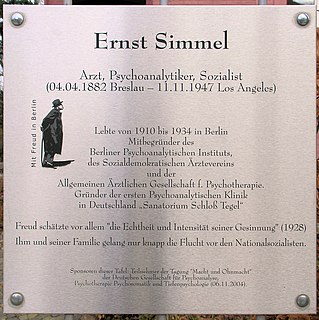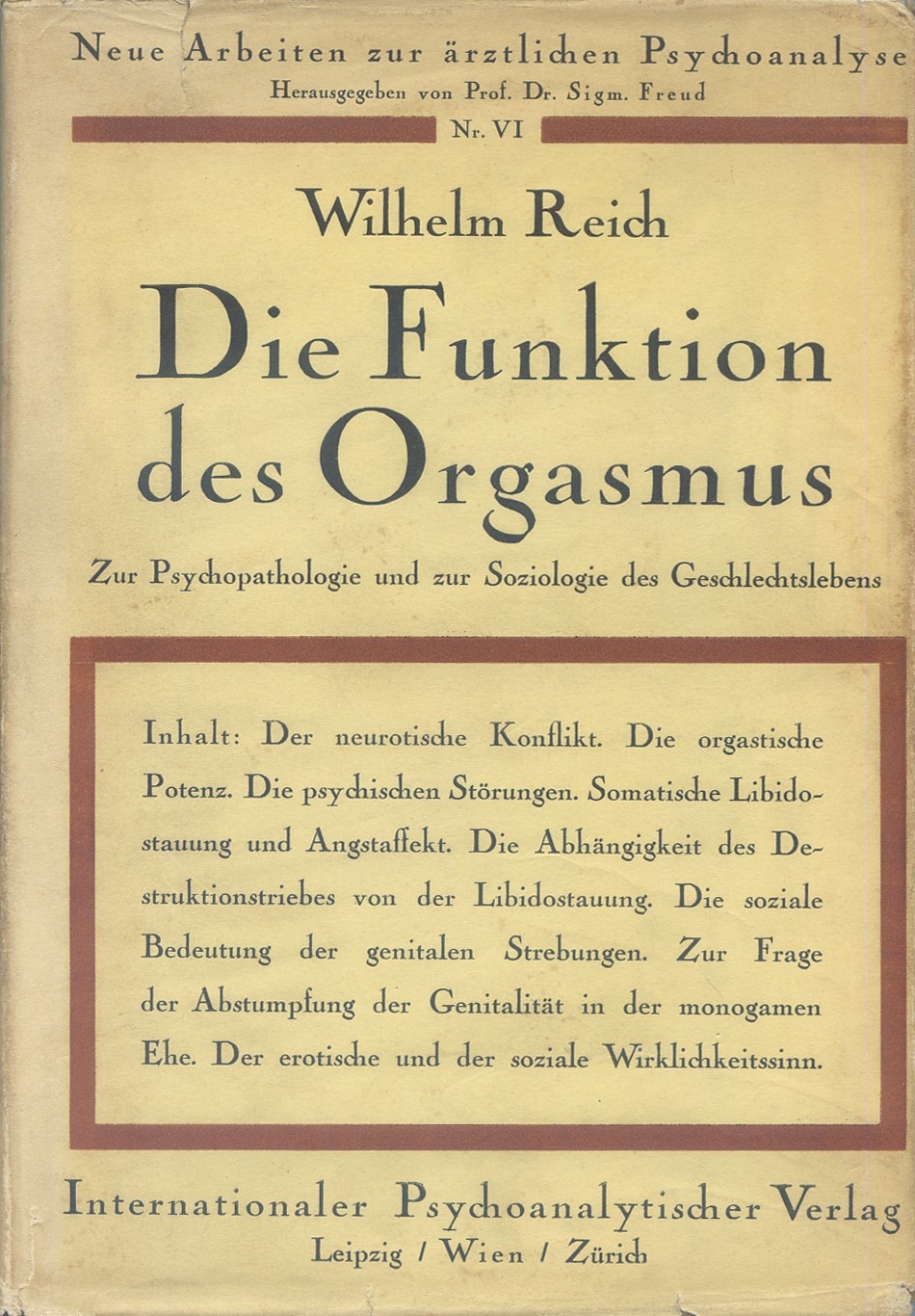Related Research Articles

Wilhelm Reich was an Austrian doctor of medicine and a psychoanalyst, along with being a member of the second generation of analysts after Sigmund Freud. The author of several influential books, most notably The Impulsive Character (1925), Character Analysis (1933), and The Mass Psychology of Fascism (1933), he became known as one of the most radical figures in the history of psychiatry.

Orgone is a pseudoscientific concept variously described as an esoteric energy or hypothetical universal life force. Originally proposed in the 1930s by Wilhelm Reich, and developed by Reich's student Charles Kelley after Reich's death in 1957, orgone was conceived as the anti-entropic principle of the universe, a creative substratum in all of nature comparable to Mesmer's animal magnetism (1779), to the Odic force (1845) of Carl Reichenbach and to Henri Bergson's élan vital (1907). Orgone was seen as a massless, omnipresent substance, similar to luminiferous aether, but more closely associated with living energy than with inert matter. It could allegedly coalesce to create organization on all scales, from the smallest microscopic units—called "bions" in orgone theory—to macroscopic structures like organisms, clouds, or even galaxies.
Gestalt therapy is a form of psychotherapy which emphasizes personal responsibility and focuses on the individual's experience in the present moment, the therapist–client relationship, the environmental and social contexts of a person's life, and the self-regulating adjustments people make as a result of their overall situation. It was developed by Fritz Perls, Laura Perls and Paul Goodman in the 1940s and 1950s, and was first described in the 1951 book Gestalt Therapy.
Wilhelm Stekel was an Austrian physician and psychologist, who became one of Sigmund Freud's earliest followers, and was once described as "Freud's most distinguished pupil". According to Ernest Jones, "Stekel may be accorded the honour, together with Freud, of having founded the first psycho-analytic society.". However, a phrase used by Freud in a letter to Stekel, "the Psychological Society founded by you," suggests that the initiative was entirely Stekel's. Jones also wrote of Stekel that he was "a naturally gifted psychologist with an unusual flair for detecting repressed material." Freud and Stekel later had a falling-out, with Freud announcing in November 1912 that "Stekel is going his own way". A letter from Freud to Stekel dated January 1924 indicates that the falling out was on interpersonal rather than theoretical grounds, and that at some point Freud developed a low opinion of his former associate. He wrote: "I...contradict your often repeated assertion that you were rejected by me on account of scientific differences. This sounds quite good in public but it doesn't correspond with the truth. It was exclusively your personal qualities - usually described as character and behavior - which made collaboration with you impossible for my friends and myself." Stekel's works are translated and published in many languages.
Body psychotherapy, also called body-oriented psychotherapy, is an approach to psychotherapy which applies basic principles of somatic psychology. It originated in the work of Pierre Janet, Sigmund Freud and particularly Wilhelm Reich who developed it as vegetotherapy. Branches also were developed by Alexander Lowen and John Pierrakos, both patients and students of Reich, like Reichian body-oriented psychotherapy.

Franz Gabriel Alexander was a Hungarian-American psychoanalyst and physician, who is considered one of the founders of psychosomatic medicine and psychoanalytic criminology.

Freudo-Marxism is a loose designation for philosophical perspectives informed by both the Marxist philosophy of Karl Marx and the psychoanalytic theory of Sigmund Freud. It has a rich history within continental philosophy, beginning in the 1920s and 1930s and running since through critical theory, Lacanian psychoanalysis, and post-structuralism.
Somatic psychology is a form of psychotherapy that focuses on somatic experience, including therapeutic and holistic approaches to the body. Body psychotherapy is a general branch of this subject, while somatherapy, eco-somatics and dance therapy, for example, are specific branches of the subject. Somatic psychology is a framework that seeks to bridge the mind-body dichotomy.
In the psychology of defense mechanisms and self-control, acting out is the performance of an action considered bad or anti-social. In general usage, the action performed is destructive to self or to others. The term is used in this way in sexual addiction treatment, psychotherapy, criminology and parenting. In contrast, the opposite attitude or behaviour of bearing and managing the impulse to perform one's impulse is called acting in.
Otto Fenichel was a psychoanalyst of the so-called "second generation".

Me and the Orgone – The True Story of One Man's Sexual Awakening (1971) is an autobiographical account written by American actor Orson Bean about his life-changing experience with the controversial orgone therapy developed by Austrian psychiatrist Wilhelm Reich.
Paul Ferdinand Schilder was an Austrian psychiatrist, psychoanalyst, and medical researcher.
Child psychotherapy, or mental health interventions for children have developed varied approaches over the last century. Two distinct historic pathways can be identified for present-day provision in Western Europe and in the United States: one through the Child Guidance Movement, the other stemming from Adult psychiatry or Psychological Medicine, which evolved a separate Child psychiatry specialism.
In psychodynamic psychotherapy, working through is seen as the process of repeating, elaborating, and amplifying interpretations. It is believed that such working through is critical towards the success of therapy.

Ola Raknes was a Norwegian psychologist, philologist and non-fiction writer. Born in Bergen, Norway, he was internationally known as a psychoanalyst in the Reichian tradition. He has been described as someone who spent his entire life working with the conveying of ideas through many languages and between different epistemological systems of reference, science and religion. For large portions of his life he was actively contributing to the public discourse in Norway. He has also been credited for his contributions to strengthening and enriching the Nynorsk language and its use in the public sphere.
Within the work of the Austrian psychoanalyst Wilhelm Reich (1897–1957), orgastic potency is a human's natural ability to experience an orgasm with certain psychosomatic characteristics and resulting in full sexual gratification.
Reichian therapy can refer to several schools of thought and therapeutic techniques whose common touchstone is their origins in the work of psychoanalyst Wilhelm Reich (1897–1957). Some examples are:
Emotional flooding is a form of psychotherapy that involves attacking the unconscious and/or subconscious mind to release repressed feelings and fears. Many of the techniques used in modern emotional flooding practice have roots in history, some tracing as far back as early tribal societies. For more information on emotional flooding, see Flooding (psychology).

Ernst Simmel was a German-American neurologist and psychoanalyst.

Die Funktion des Orgasmus is a monograph about the ability to achieve orgasm published in 1927 by Sigmund Freud's follower Wilhelm Reich, later published in English as Genitality in the Theory and Therapy of Neurosis. In it, Reich proposed, based on his therapeutic experience and empirical studies, that orgastic potency should be used as a decisive criterion for mental health.
References
- ↑ Franz Alexander et al eds., Psychoanalytic Pioneers (1995) p. 436
- ↑ Wilhelm Reich, Character Analysis (1976) p. 372-3
- ↑ Reich, p. 397
- ↑ Blasband, Richard (2012). "Working with the Body in Psychotherapy from a Reichian Viewpoint". The Orgonomic Institute of Northern California. Archived from the original on 27 September 2013.
- ↑ Tree Staunton, Body Psychotherapy (2002) p. 40
- ↑ Description of Orgone Therapy 1
- ↑ Description of Orgone Therapy 2
- ↑ Description of Orgone Therapy 3
- ↑ A patient's description of vegetotherapy
- ↑ "circular muscles". 7 October 2019.
- ↑ Dr. Elsworth Baker on Orgonomy
- ↑ film Room for Happiness
- ↑ "American College of Orgonomy".
- ↑ Otto Fenichel, The Psychoanalytic Theory of Neurosis (1946) p. 249
- ↑ Fenichel, p. 562-3